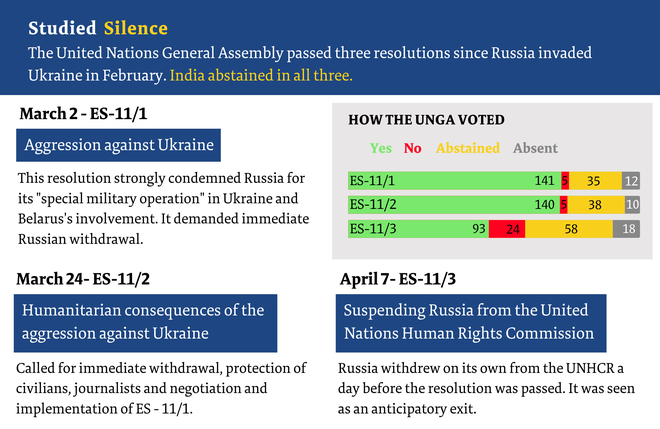News Analysis |
While there was little doubt over the outcome of the US-Albania sponsored UN Security Council draft Resolution on Friday criticising Russian referendums in four Ukrainian regions, given Russia’s veto-power, many Western diplomats had held out hope that India’s vote would have shifted from past “abstentions” to a “yes vote” on this occasion. One of the reasons was Prime Minister Narendra Modi’s comments to Russian President Vladimir Putin in Samarkand in mid-September on the “era of war” having ended, that were interpreted as a snub to Mr. Putin, something French President Emmanuel Macron praised at the UN. Another was India’s decision to vote in favour of allowing Ukraine President Volodmyr Zelenskyy to address the UNSC and UNGA in the same month.
In addition, External Affairs Minister S. Jaishankar’s speech at the UNGA where he spoke of India being “on the side of the UN charter”, and his statement at a press conference in Washington to “wait and see” what India’s Ambassador to the UN Ruchira Khamboj would say in response to the Russian referendums had sparked speculation that India would change its previous policy, since February 24, of abstaining on votes at the UNGA, UNSC, Human Rights Council (HRC) and International Atomic Energy Agency (IAEA) on votes criticising Russia’s actions.
In particular, the resolution was brought to the UNSC with considerable speed, and the vote took place hours after Mr. Putin’s speech formalising the “annexation” of Donetsk, Luhansk, Kherson and Zaporizhzhia regions, comprising about 15% of Ukrainian territory, and came on the same day that Mr. Zelenskyy applied for an “accelerated” membership of the NATO military alliance between North America and Europe, which had further bolstered Western hopes of gaining support.
However, experts say that US and European diplomats, had misread New Delhi’s statements and taken PM Modi’s phrase on the “era of war” ending out of context from his entire statement.
“It is necessary to study everything the PM said [in Samarkand] and to realise he has said this in the past as well. In fact, all elements of India’s position (need for a ceasefire, ending the war, concerns about impact on food and energy security) have been consistently articulated by the government,” said National Security Advisory Board Chairman P.S. Raghavan, pointing to PM Modi’s comments to German Chancellor Scholz in May that “there will be no winning party in this war, everyone will suffer”, as a statement made in the same vein.

Officials also pointed to India’s voting record on Russia’s annexation of Crimea, where India abstained on the UNGA resolution 68/262 in March 2014, and subsequently from 2016-2021, actually voted against (“no” vote) Ukrainian resolutions criticising Russia for human rights violations in Crimea that were discussed at the UN’s Third Committee meetings. India’s position will be tested again this week as the UNGA is expected to take up the same resolution on Russian referendums that were vetoed by Russia at the UNSC.
In New Delhi, some say India’s position on Russia is becoming more difficult. “I lend zero credibility to the sham referenda organised by Russia. My sense is the government of India sees this no differently. Despite the optics, in both the West and in India there is extreme and equal exasperation at Putin’s actions since February 24,” tweeted Ashok Malik, Partner at Asia Group consultancy, who was the Policy Advisor to the Ministry of External Affairs (MEA) until September this year, indicating differences inside the government over the issue.
However, former Indian Ambassador to Russia Venkatesh Verma said that India’s consistent stand has been to call for all sides of the Ukraine conflict to find “off-ramps”, adding that the war is no longer a territorial conflict, but a “systemic conflict” with possibly nuclear dimensions.
“Perhaps the time has come for the imperatives for international peace take precedence over all other principles or objectives involving the Ukraine conflict. The big powers must get back to the ethic of mutual accommodation,” Mr. Verma told The Hindu, suggesting that both Russia and the NATO ally countries must revise their positions to end the war now.







